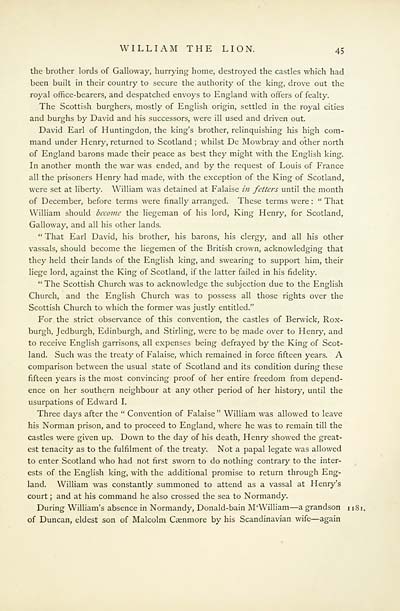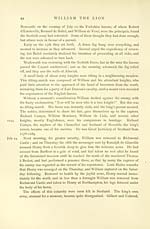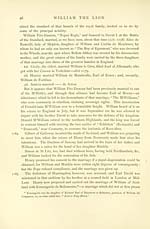Family records of the Bruces and the Cumyns
(57) Page 45
Download files
Complete book:
Individual page:
Thumbnail gallery: Grid view | List view

WILLIAM THE LION. 45
the brother lords of Galloway, hurrying home, destroyed the castles which had
been built in their country to secure the authority of the king, drove out the
royal office-bearers, and despatched envoys to England with offers of fealty.
The Scottish burghers, mostly of English origin, settled in the royal cities
and burghs by David and his successors, were ill used and driven out.
David Earl of Huntingdon, the king's brother, relinquishing his high com-
mand under Henry, returned to Scotland ; whilst De Mowbray and other north
of England barons made their peace as best they might with the English king.
In another month the war was ended, and by the request of Louis of France
all the prisoners Henry had made, with the exception of the King of Scotland,
were set at liberty. William was detained at Falaise in fetters until the month
of December, before terms were finally arranged. These terms were : " That
William should become the liegeman of his lord, King Henry, for Scotland,
Galloway, and all his other lands.
" That Earl David, his brother, his barons, his clergy, and all his other
vassals, should become the liegemen of the British crown, acknowledging that
they held their lands of the English king, and swearing to support him, their
liege lord, against the King of Scotland, if the latter failed in his fidelity.
"The Scottish Church was to acknowledge the subjection due to the English
Church, and the English Church was to possess all those rights over the
Scottish Church to which the former was justly entitled."
For the strict observance of this convention, the castles of Benvick, Rox-
burgh, Jedburgh, Edinburgh, and Stirling, were to be made over to Henry, and
to receive English garrisons, all expenses being defrayed by the King of Scot-
land. Such was the treaty of Falaise, which remained in force fifteen years. A
comparison between the usual state of Scotland and its condition during these
fifteen years is the most convincing proof of her entire freedom from depend-
ence on her southern neighbour at any other period of her history, until the
usurpations of Edward I.
Three days after the " Convention of Falaise " William was allowed to leave
his Norman prison, and to proceed to England, where he was to remain till the
castles were given up. Down to the day of his death, Henry showed the great-
est tenacity as to the fulfilment of the treaty. Not a papal legate was allowed
to enter Scotland who had not first sworn to do nothing contrary to the inter-
ests of the English king, with the additional promise to return through Eng-
land. William was constantly summoned to attend as a vassal at Henry's
court ; and at his command he also crossed the sea to Normandy.
During William's absence in Normandy, Donald-bain M William — a grandson 1181.
of Duncan, eldest son of Malcolm Csnmore by his Scandinavian wife — again
the brother lords of Galloway, hurrying home, destroyed the castles which had
been built in their country to secure the authority of the king, drove out the
royal office-bearers, and despatched envoys to England with offers of fealty.
The Scottish burghers, mostly of English origin, settled in the royal cities
and burghs by David and his successors, were ill used and driven out.
David Earl of Huntingdon, the king's brother, relinquishing his high com-
mand under Henry, returned to Scotland ; whilst De Mowbray and other north
of England barons made their peace as best they might with the English king.
In another month the war was ended, and by the request of Louis of France
all the prisoners Henry had made, with the exception of the King of Scotland,
were set at liberty. William was detained at Falaise in fetters until the month
of December, before terms were finally arranged. These terms were : " That
William should become the liegeman of his lord, King Henry, for Scotland,
Galloway, and all his other lands.
" That Earl David, his brother, his barons, his clergy, and all his other
vassals, should become the liegemen of the British crown, acknowledging that
they held their lands of the English king, and swearing to support him, their
liege lord, against the King of Scotland, if the latter failed in his fidelity.
"The Scottish Church was to acknowledge the subjection due to the English
Church, and the English Church was to possess all those rights over the
Scottish Church to which the former was justly entitled."
For the strict observance of this convention, the castles of Benvick, Rox-
burgh, Jedburgh, Edinburgh, and Stirling, were to be made over to Henry, and
to receive English garrisons, all expenses being defrayed by the King of Scot-
land. Such was the treaty of Falaise, which remained in force fifteen years. A
comparison between the usual state of Scotland and its condition during these
fifteen years is the most convincing proof of her entire freedom from depend-
ence on her southern neighbour at any other period of her history, until the
usurpations of Edward I.
Three days after the " Convention of Falaise " William was allowed to leave
his Norman prison, and to proceed to England, where he was to remain till the
castles were given up. Down to the day of his death, Henry showed the great-
est tenacity as to the fulfilment of the treaty. Not a papal legate was allowed
to enter Scotland who had not first sworn to do nothing contrary to the inter-
ests of the English king, with the additional promise to return through Eng-
land. William was constantly summoned to attend as a vassal at Henry's
court ; and at his command he also crossed the sea to Normandy.
During William's absence in Normandy, Donald-bain M William — a grandson 1181.
of Duncan, eldest son of Malcolm Csnmore by his Scandinavian wife — again
Set display mode to:
![]() Universal Viewer |
Universal Viewer | ![]() Mirador |
Large image | Transcription
Mirador |
Large image | Transcription
Images and transcriptions on this page, including medium image downloads, may be used under the Creative Commons Attribution 4.0 International Licence unless otherwise stated. ![]()
| Histories of Scottish families > Family records of the Bruces and the Cumyns > (57) Page 45 |
|---|
| Permanent URL | https://digital.nls.uk/95071670 |
|---|
| Description | A selection of almost 400 printed items relating to the history of Scottish families, mostly dating from the 19th and early 20th centuries. Includes memoirs, genealogies and clan histories, with a few produced by emigrant families. The earliest family history goes back to AD 916. |
|---|

